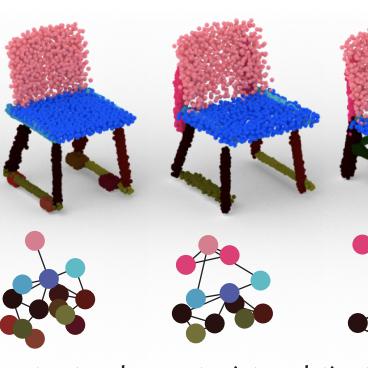Search Results for author: Madhava Krishna
Found 11 papers, 4 papers with code
QueSTMaps: Queryable Semantic Topological Maps for 3D Scene Understanding
no code implementations • 9 Apr 2024 • Yash Mehan, Kumaraditya Gupta, Rohit Jayanti, Anirudh Govil, Sourav Garg, Madhava Krishna
Understanding the structural organisation of 3D indoor scenes in terms of rooms is often accomplished via floorplan extraction.
Anticipate & Collab: Data-driven Task Anticipation and Knowledge-driven Planning for Human-robot Collaboration
no code implementations • 4 Apr 2024 • Shivam Singh, Karthik Swaminathan, Raghav Arora, Ramandeep Singh, Ahana Datta, Dipanjan Das, Snehasis Banerjee, Mohan Sridharan, Madhava Krishna
Specifically, DaTAPlan planner computes actions for an agent and a human to collaboratively and jointly achieve the tasks anticipated by the LLM, and the agent automatically adapts to unexpected changes in human action outcomes and preferences.
LIP-Loc: LiDAR Image Pretraining for Cross-Modal Localization
no code implementations • 27 Dec 2023 • Sai Shubodh Puligilla, Mohammad Omama, Husain Zaidi, Udit Singh Parihar, Madhava Krishna
We apply this approach to the domains of 2D image and 3D LiDAR points on the task of cross-modal localization.
EDMP: Ensemble-of-costs-guided Diffusion for Motion Planning
1 code implementation • 20 Sep 2023 • Kallol Saha, Vishal Mandadi, Jayaram Reddy, Ajit Srikanth, Aditya Agarwal, Bipasha Sen, Arun Singh, Madhava Krishna
However, without a prior understanding of what diverse valid trajectories are and without specially designed cost functions for a given scene, the overall solutions tend to have low success rates.
AnyLoc: Towards Universal Visual Place Recognition
1 code implementation • 1 Aug 2023 • Nikhil Keetha, Avneesh Mishra, Jay Karhade, Krishna Murthy Jatavallabhula, Sebastian Scherer, Madhava Krishna, Sourav Garg
In this work, we develop a universal solution to VPR -- a technique that works across a broad range of structured and unstructured environments (urban, outdoors, indoors, aerial, underwater, and subterranean environments) without any re-training or fine-tuning.
 Ranked #1 on
Visual Place Recognition
on Nardo-Air R
Ranked #1 on
Visual Place Recognition
on Nardo-Air R
Sequence-Agnostic Multi-Object Navigation
no code implementations • 10 May 2023 • Nandiraju Gireesh, Ayush Agrawal, Ahana Datta, Snehasis Banerjee, Mohan Sridharan, Brojeshwar Bhowmick, Madhava Krishna
The Multi-Object Navigation (MultiON) task requires a robot to localize an instance (each) of multiple object classes.
ConceptFusion: Open-set Multimodal 3D Mapping
1 code implementation • 14 Feb 2023 • Krishna Murthy Jatavallabhula, Alihusein Kuwajerwala, Qiao Gu, Mohd Omama, Tao Chen, Alaa Maalouf, Shuang Li, Ganesh Iyer, Soroush Saryazdi, Nikhil Keetha, Ayush Tewari, Joshua B. Tenenbaum, Celso Miguel de Melo, Madhava Krishna, Liam Paull, Florian Shkurti, Antonio Torralba
ConceptFusion leverages the open-set capabilities of today's foundation models pre-trained on internet-scale data to reason about concepts across modalities such as natural language, images, and audio.
SCARP: 3D Shape Completion in ARbitrary Poses for Improved Grasping
no code implementations • 17 Jan 2023 • Bipasha Sen, Aditya Agarwal, Gaurav Singh, Brojeshwar B., Srinath Sridhar, Madhava Krishna
Unlike existing methods that depend on an external canonicalization, SCARP performs canonicalization, pose estimation, and shape completion in a single network, improving the performance by 45% over the existing baselines.
Canonical Fields: Self-Supervised Learning of Pose-Canonicalized Neural Fields
1 code implementation • CVPR 2023 • Rohith Agaram, Shaurya Dewan, Rahul Sajnani, Adrien Poulenard, Madhava Krishna, Srinath Sridhar
We present Canonical Field Network (CaFi-Net), a self-supervised method to canonicalize the 3D pose of instances from an object category represented as neural fields, specifically neural radiance fields (NeRFs).
Spatial Relation Graph and Graph Convolutional Network for Object Goal Navigation
no code implementations • 27 Aug 2022 • D. A. Sasi Kiran, Kritika Anand, Chaitanya Kharyal, Gulshan Kumar, Nandiraju Gireesh, Snehasis Banerjee, Ruddra dev Roychoudhury, Mohan Sridharan, Brojeshwar Bhowmick, Madhava Krishna
This paper describes a framework for the object-goal navigation task, which requires a robot to find and move to the closest instance of a target object class from a random starting position.
Object Goal Navigation using Data Regularized Q-Learning
no code implementations • 27 Aug 2022 • Nandiraju Gireesh, D. A. Sasi Kiran, Snehasis Banerjee, Mohan Sridharan, Brojeshwar Bhowmick, Madhava Krishna
Our framework incrementally builds a semantic map of the environment over time, and then repeatedly selects a long-term goal ('where to go') based on the semantic map to locate the target object instance.









